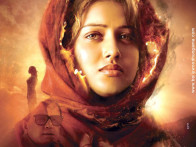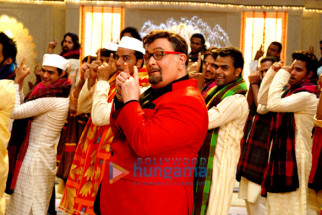Music: Ismail Darbar, Salim-Sulaiman & Subhash Ghai
Lyrics: Irshad Kamil & Subhash Ghai
Music Label: Mukta Music
Expectations:
Subhash Ghai and his sense of music are legendary. Karz, Hero, Karma, Ram Lakhan, Saudagar, Khal-Nayak, Pardes, Taal, Yaadein, Kisna - the music of all these films burst charts or at least won hearts even if the later films did not work. His last two directorials, Black-And-White and Yuvvraaj, also had their musical moments.
Expectations thus are set at a high.
Music:
It takes a subsequent track ('Kambal Ke Neeche') to realize what we suspected in the title-song 'Kaanchi Re Kaanchi' (Sukhwinder Singh) - that Subhash Ghai's use of musical riffs and passages from many old cult songs is intentional. Since Ghai's sense of music is entirely visual, we will make final sense of this only when watching the movie.
Take the smartly-penned (Irshad Kamil) 'Kambal Ke Neeche / Ishq Bageeche Aaja Seenche', which seems to be a celebration of a couple's wedding night without being in-your-face. Sung by Aman Trikha with Neeti Mohan, Aishwarya Majmudar and Sanchita Bhattacharya, it also has tributes in the lyrics to a bevy of old hits from Ghai films like 'Do Dil Mil Rahe Hain' and 'Yeh Dil Deewana'(Pardes), 'Nayak Nahin Khalnayak Hoon Main' (Khal-Nayak), 'Ramta Jogi' (Taal), 'Jab Dil Mile' (Yaadein) and 'Aashayein Aashayein' (Iqbal).
Separating the men from the boys in this brilliantly conceived song, Irshad even makes sense of the above words in the context here ('Aashayein Aashayein / Kambal Ke Neeche'), leaving us to appreciate the subtle erotica ('Bhaiya Deewaane Hue / Kambal Ke Neeche / Bhabhi Sayaani Hui / Kambal Ke Neeche') in an era where brazenness is endemic.
The fours singers have a good time here and Neeti Mohan stands out among them. This Ismail Darbar composition maintains a rhythmic two-line pattern that is seldom broken. The few lines in English towards the end, we hope, will be situational too.
Sukhwinder Singh has a vocal blast in the title-track, 'Kaanchi Re Kaanchi' imparting the breezy and straight, typical Ghai's-film composition with complex but delicious curves and nuances. The trumpet and the guitar twangs are a delight, and the punchy chorus is cute. The lyrics are simple and the atmopsheric feel is infectious.
We move to 'Tu sab kuch re', the most layered, finely-honed composition on the soundtrack, with its lows and crescendos set to a relentless beat, so typical of both Ghai's tastes and composer Ismail Darbar's skills even individually.
Anweshaa is supple, giving Sonu Nigam aptly 'passionate' company in this almost Sufi-ana love song. Irshad Kamil's poetic lyrics do not tread new territory, but the melody gives them a fresh dimension. Anweshaa reminds vintage Ghai music buffs of an amalgam of Alka Yagnik and Kavita Krishnamurthy Subramaniam in the earlier musicals of the banner.
What we also liked best about this most accomplished track on the soundtrack is the seamless flow from antara to mukhda and from the higher octaves to the lower notes. The use of chorus whisks us back to the era when melody sat regal on an unshakeable throne. Once again, the way the chorus is interpolated and the return to the main track with the use of backing vocals by Ismail himself is done with a rare sensitivity unheard of in today's musically cluttered times.
Ankit Aashiqui 2 Tiwari is given a vocal challenge in the litany 'Kaisa Hai Dard Mera', and we wonder why, like many singers today, he gets into the Arijit Singh vocal mode. Ismail's haunting musical style comes to the fore in the retro feel of the track, which is a welcome break from the overdone Sufi-ana pathos of today.
The orchestration is likeable, but we wonder why a male singer was needed to express female sentiments! So the question arises: is a high-pitched male voice, backed by a rock guitar, really needed to express the sentiments of a simple girl from an unspoiled village that Kaanchi is said to be? This song would be truly noteworthy in a different milieu if used for a male protagonist!
'Koshampa' (Aman Trikha-Sanchita Bhattacharya-Anweshaa with some introductory words by Subhash Ghai) extols the village of that name, said to be Kaanchi's hometown, in its lyrics. The song is set to some heady beats with patriotic riffs from 'Saare Jahaan Se Accha' added. The orchestration gets a shade too noisy on occasion and the song ends up as an average number.
Ismail Darbar's final track, 'Adiye Adiye' (Sanchita Bhattacharya-Avril Quadros) emerges as contemporary as they come in its packaging, but with a strong and naughty folk inflection blended with some heavy percussion and fast-paced beats. The quaint and obviously completely situational song is sung in a gimmicky way and sounds cute, though it caters to niche tastes and lacks an enduring quality.
Subhash Ghai turns music maker with 'Main Mushtanda' (Mika-Aishwarya Majumdar-Earl Edgar), a modern rap number for which he himself pens the lyrics (after his attempt in Jogger's Park). Irreverent and dark, it is saucily drawled out by Mika, with Aishwarya belting out the contrasting lines to Mika's aggressive words. The arrangements are interesting for this genre of songs, after the extremely predictable way with which the track begins.
Salim-Sulaiman's 'Thumka' could belong to any urban film of our times. The tune is overtly familiar and might be composed by any music maker today, cloaked in all the 'current coin' synthetic razzmatazz. The song remains with you only till it is on, thanks to Sonu Nigam's vocals, while Suzanne D'Mello's vocals are largely incomprehensible and unclear.
The duo's 'Jai He' (Sukhwinder Singh-Mohit Chauhan-Raj Pandit) is impressively orchestrated. Irshad Kamil presents a trenchant poser ('Itna bada jahaan hai / Chalo dhoondh laaye ussko / Saare jahaan se accha / woh Hindustan kahaan hai?') and goes on to pen rabble-rousing words about our leaders singing the national anthem without understanding the true meaning of the words. But its noisy rock-like treatment could have been dispensed with for a weightier acoustic treatment that would have actually enhanced the impact.
Overall:
This is a score that has its highs but lacks uniformity in caliber. It will work only after the film makes a mark, hence the rating.
Our Pick:
'Kanchi Re Kaanchi', 'Tu Sab Kuch Re', 'Kambal Ke Neeche', 'Hindustan Kahaan Hai'










